

How to stop procrastinating. There Are 3 Types of Procrastinators. This Flowchart Will Tell You Which One You Are. In order to figure out what medicine to take you first have to figure out what you've got. Is it a brain tumor, a migraine, or a bad hangover? The answer will determine whether you opt for aspirin or surgery. And what's true for medical conditions, is equally true for day-to-day (and far less terrifying) productivity problems. How to Make Yourself Work When You Just Don’t Want To. There’s that project you’ve left on the backburner – the one with the deadline that’s growing uncomfortably near.
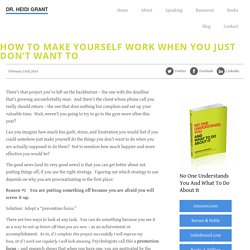
And there’s the client whose phone call you really should return – the one that does nothing but complain and eat up your valuable time. Wait, weren’t you going to try to go to the gym more often this year? Can you imagine how much less guilt, stress, and frustration you would feel if you could somehow just make yourself do the things you don’t want to do when you are actually supposed to do them? Not to mention how much happier and more effective you would be? Overcoming procrastination: A flow-chart approach - Dr. Patrick Keelan, Calgary Psychologist.
In this article, I discuss several strategies to overcome procrastination and the order in which to use them.
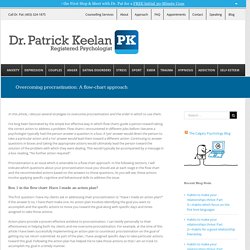
I’ve long been fascinated by the simple but effective way in which flow charts guide a person toward taking the correct action to address a problem. Flow charts I encountered in different jobs before I became a psychologist typically had the person answer a question in a box. A ‘yes’ answer would direct the person to take a particular action and a ‘no’ answer would lead them toward a different action.
Continuing to answer questions in boxes and taking the appropriate actions would ultimately lead the person toward the solution of the problem with which they were dealing. Procrastination: A Brief Guide on How to Stop Procrastinating. Procrastination is a challenge we have all faced at one point or another.
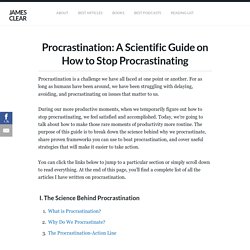
For as long as humans have been around, we have been struggling with delaying, avoiding, and procrastinating on issues that matter to us. During our more productive moments, when we temporarily figure out how to stop procrastinating, we feel satisfied and accomplished. Today, we’re going to talk about how to make those rare moments of productivity more routine. The purpose of this guide is to break down the science behind why we procrastinate, share proven frameworks you can use to beat procrastination, and cover useful strategies that will make it easier to take action. You can click the links below to jump to a particular section or simply scroll down to read everything. Moving the Finish Line: The Goal Gradient Hypothesis. How to get massively motivated in less than 60 seconds - Commit Action. Confession time: Even highly driven and productive entrepreneurs still struggle every day to turn on their motivation when they need it.
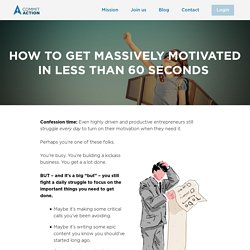
Perhaps you’re one of these folks. Charles Duhigg's Productivity Tips from Smarter, Faster, Better. Why is it that the more work I have to do, the more the internet beckons me into its endless maw of distraction?

Oh Lord, I will say, appealing both to myself and to whatever blog-god might be listening, I have an hour to finish this article. Daniel Pink on Incentives and the Two Types of Motivation. Motivation is a tricky multifaceted thing.

How do we motivate people to become the best they can be? How do we motivate ourselves? Sometimes when we are running towards a goal we suddenly lose steam and peter out before we cross the finish line. Why do we lose our motivation part way to achieving our goal? Dan Pink wrote an excellent book on motivation called Drive: The Surprising Truth About What Motivates Us. The Procrastination Doom Loop—and How to Break It. When scientists have studied procrastination, they've typically focused on how people are miserable at weighing costs and benefits across time.
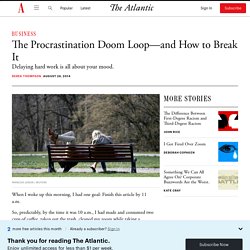
For example, everybody recognizes, in the abstract, that it's important to go to the dentist every few months. The pain is upfront and obvious—dental work is torture—and the rewards of cleaner teeth are often remote, so we allow the appointment to slip through our minds and off our calendars. Across several categories including dieting, saving money, and sending important emails, we constantly choose short and small rewards (whose benefits are dubious, but immediate) over longer and larger payouts (whose benefits are obvious, but distant). In the last few years, however, scientists have begun to think that procrastination might have less to do with time than emotion. Procrastination "really has nothing to do with time-management,” Joseph Ferrari, a professor of psychology at DePaul University, told Psychological Science. The Akrasia Effect: Why We Don’t Follow Through on Things. By the summer of 1830, Victor Hugo was facing an impossible deadline.
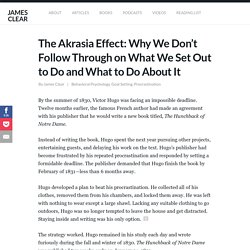
Twelve months earlier, the famous French author had made an agreement with his publisher that he would write a new book titled, The Hunchback of Notre Dame. Instead of writing the book, Hugo spent the next year pursuing other projects, entertaining guests, and delaying his work on the text. Hugo's publisher had become frustrated by his repeated procrastination and responded by setting a formidable deadline. The publisher demanded that Hugo finish the book by February of 1831—less than 6 months away.
Hugo developed a plan to beat his procrastination. The strategy worked. How I Learned to Stop Procrastinating, & Love Letting Go. ‘People have a hard time letting go of their suffering.
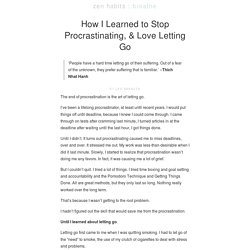
Out of a fear of the unknown, they prefer suffering that is familiar.’ ~Thich Nhat Hanh By Leo Babauta The end of procrastination is the art of letting go. I’ve been a lifelong procrastinator, at least until recent years. How to Stop Procrastinating and Do the Right Thing, More Often. 6 Scientific Tactics to Stop Procrastinating. The Mechanics of Preventing Procrastination. Procrastination is, in essence, stealing from yourself.
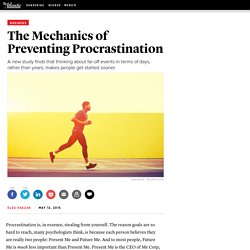
The reason goals are so hard to reach, many psychologists think, is because each person believes they are really two people: Present Me and Future Me. Kick Your Procrastination Problem This Weekend. Self-Imposed Deadlines Don't Stop Procrastination. Here's What Might. Mark Twain advised people never to put off until tomorrow what they can put off until the day after, and a lot of us listen. Estimates suggest that 15% to 20% of all people are chronic procrastinators, and that share goes up for situational delay: As one example, four in five people put off retirement savings despite knowing better. Then there are the innumerable office procrastinators, many identifiable by the mere fact that they're reading this article.
The devious thing about procrastination is that while we tend to shrug or laugh it off as part of the work process, evidence suggests it's far from harmless. At the root of the problem is our failure to differentiate between simply delaying a task, perhaps a healthy sign of organizational skills, and truly procrastinating on it, a self-defeating habit people know will hurt them later--a little like smoking.
Structured Procrastination. The Common Pattern To Procrastination. “Think of all the years passed by in which you said to yourself “I’ll do it tomorrow,” and how the gods have again and again granted you periods of grace of which you have not availed yourself. It is time to realize that you are a member of the Universe, that you are born of Nature itself, and to know that a limit has been set to your time.” — Marcus Aurelius If you procrastinate, you’re in good company.
Most of us, and I’m talking like 95% of people here, are in the same boat. “To stop procrastinating” is one of the top goals of many people I run into. In his book, The Procrastination Equation: How to Stop Putting Things Off and Start Getting Stuff Done, Piers Steel says “Procrastination is pervasive. Steel perfectly describes the pattern common to all procrastination: At the start of a big project, time is abundant. Eventually, time’s limited nature reveals itself. How To Stop Procrastinating: 4 New Steps Backed By Research. I don’t wanna. I don’t wanna. I don’t wanna. It’s awful and horrible. I hear it causes cancer. Why You Can Never Finish Anything And How to Finally Change It. The law of inertia tells us a body in motion stays in motion.
And the same goes for projects, creative ideas, daily tasks, half-written emails, and that thing you stopped working on to read this article. When you interrupt a task, it can be difficult to pick it up again. And we are interrupted nearly every three minutes, according to Gloria Mark, professor of informatics at University of California, Irvine. 4 Habits Of Punctual People. Plan any event and chances are one in five of the people you invite will be late. A study done at San Francisco State University found that about 20% of the U.S. population is chronically late—but it’s not because they don't value others' time.
Inc.com. The unfortunate reality about the workplace today is that many people under-perform their capabilities. Why We Procrastinate - Issue 16: Nothingness. The British philosopher Derek Parfit espoused a severely reductionist view of personal identity in his seminal book, Reasons and Persons: It does not exist, at least not in the way we usually consider it. The Science of Procrastination - And How To Manage It. How to Stop Procrastinating and Boost Your Willpower by Using “Temptation Bundling" Like many people, Katy Milkman knew she should be exercising more. But each day she left her job as a professor at the University of Pennsylvania feeling exhausted and drained. By the time she made it home, all she wanted to do was curl up on the couch and read a book or turn on her favorite TV show.
On this particular day, she wanted to read The Hunger Games.